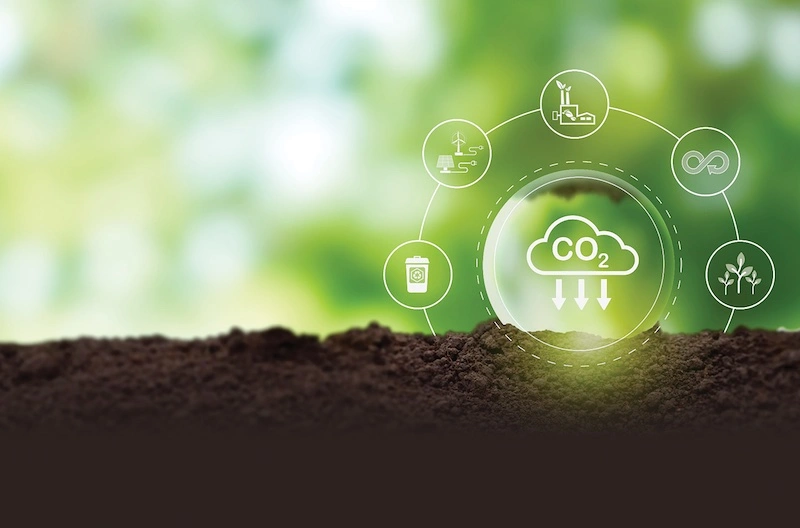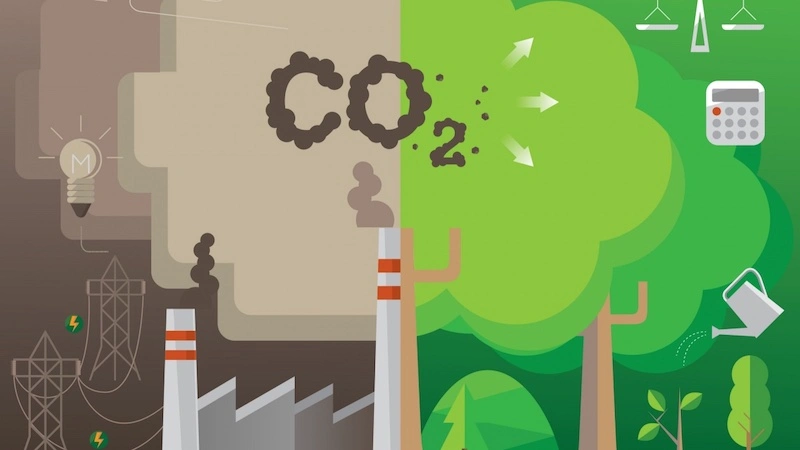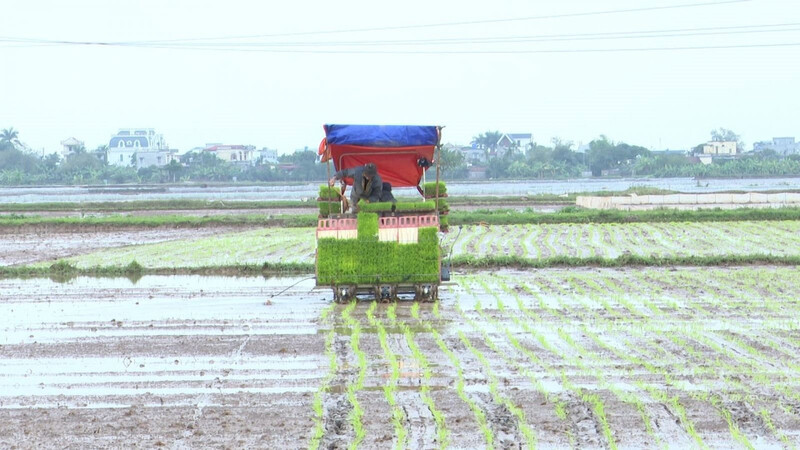General assessment of the carbon credit market in Vietnam
How is the carbon credit market in Vietnam currently assessed and what is its potential? Find out now through the following article
20 March 2024
Assessment of the Carbon Credit Market in Vietnam
Although not officially operational, the carbon credit market in Vietnam has seen the implementation of hundreds of independent carbon credit projects up to international standards. As a result, it has not only helped Vietnam accelerate its achievement of greenhouse gas emission reduction targets but also brought in financing of up to billions of US dollars. Specifically, how is the carbon credit market in Vietnam assessed currently, and what is its potential? Let's delve into this with Minmax Green in the following article!
The Condition of the Carbon Credit Market in Vietnam
In a context where Vietnamese businesses are increasingly aware of their commitment to emission reduction, backed by policies that promote and support emission reduction practices, the participation of businesses in the government's carbon credit market, and vast resources has led to the assessment of the carbon credit market in Vietnam as extremely promising.
The Potential of Carbon Credits in Vietnam
According to the head of the Climate Change Department at the Ministry of Natural Resources and Environment, Vietnam ranks among the top four countries in terms of Clean Development Mechanism (CDM) projects, following China, Brazil, and India. Moreover, it is the ninth out of 80 countries with issued CDM credits. Even voluntary carbon credit exchanges from Vietnam to the world have been conducted by institutions and businesses beginning in the mid-2000s. According to the most recently updated data, there are over 300 programs and projects registered for the implementation of exchange and offset carbon mechanisms. Specifically, approximately 150 programs and projects have been issued 40.2 million credits and have traded them on the international carbon market.
Vietnam has registered over 300 programs and projects to implement carbon offset mechanisms (Image source: vneconomy.vn)
Carbon credits that are being implemented through carbon exchange mechanisms to reduce greenhouse gas emissions have the potential to generate significant trading commodities in the market, attracting potential profits of billions of USD. In fact, it is estimated that Vietnam can export 57 million carbon credits to international organizations. This indicates that by selling carbon credits at $5 per credit, Vietnam can generate hundreds of millions of dollars in revenue annually. In Vietnam's carbon credit market, many companies engaged in various industries are expected to gain a significant profit from buying and selling carbon credits. It is predicted that Vietnam will achieve a 9% reduction in total greenhouse gas emissions compared to standard development scenarios (equivalent to 83.9 million tons of CO2).
The steel industry and solid waste processing hold potential for generating considerable income.
Currently, there are approximately 300 small and medium-sized enterprises engaged in the steel production industry nationwide. According to statistics provided by WTO - FTA - the Vietnam Chamber of Commerce and Industry, the steel production industry accounts for about 17% of the total national greenhouse gas emissions.
The steel production industry could be a potential source of revenue (Image source: Collected).
Therefore, this field is selected by the Ministry of Industry and Trade to pilot carbon credits for National Greenhouse Gas Emission Reduction (NAMA) actions. This is seen as a new direction – a solid step in building a roadmap for participating in the carbon credit market in Vietnam, and it is expected to expand to other energy-intensive industries in the medium and long term. Moreover, the efficient handling of emissions and solid waste, transforming these into renewable energy resources to serve the benefit of humans, also matters and will contribute to achieving revenue potential.
As an example, the attempt to pilot carbon credit issuance in the steel industry serves as a significant premise for implementing greenhouse gas emission reduction in the industrial sector. At present, the Ministry is collaborating with various departments and international partners to explore cooperation opportunities and mobilize financial resources for the implementation of greenhouse gas emission reduction actions in the steel industry. Whether through carbon credit trading or nongovernmental compensation programs, climate-conscious industries require more rigorous strategies to create a sustainable, low-carbon economy.
Carbon credits are also expected to play an increasingly significant role in the forestry and agricultural sectors in Vietnam, given the country's vast forested area and potential capacity to absorb carbon emissions. As of now, Vietnam has approximately 14.7 million hectares of forest, absorbing an average of around 69.8 million tons of CO2 yearly. This includes 80% natural forests and 20% planted forests.
Forest carbon credits and agricultural carbon credits have great potential for future development.
Vietnam is one of the countries with vast forested areas and strong potential for carbon emission reduction through carbon credits. According to the Ministry of Agriculture and Rural Development, as of the present time, Vietnam has nearly 14.7 million hectares of forests, absorbing an average of about 69.8 million tons of CO2 annually. Of these, 80% are natural forests, and 20% are planted forests.
Therefore, utilizing carbon credits from forests not only brings many benefits to the environment, ecosystem protection, and biodiversity but also has many economic and social benefits, creating livelihoods for local communities.
Currently, the government and local organizations have begun implementing many forest management, protection, and restoration projects, along with the creation of forest carbon credits. For example, Vietnam's carbon credit market includes projects such as REDD+ and sustainable forest management.
In the agricultural sector, Vietnam is also striving to develop and promote various sustainable agricultural activities aimed at reducing carbon emissions. Overall, the carbon credit market in Vietnam for the agricultural sector is still in the early stages of development. There needs to be more coordination between the government, international organizations, investors, etc., to build a more complete infrastructure and system.
Agricultural carbon credits have significant potential for future development (Image source: IPCC and FAOSTAT).
Have carbon credits been sold in Vietnam?
The development of the carbon credit market in Vietnam is one of the economic instruments included in the Environmental Protection Law (amended) passed by the National Assembly. Over the years, although Vietnam has been able to produce carbon credits and engage in initial transactions, it has not received much attention.
As mentioned, since the mid-2000s, some Vietnamese enterprises have sold carbon credits on the international market. To date, the carbon credit market in Vietnam has had over 100 projects available for trading on the international market. Companies and organizations across the country have around 41 million credits, ranking fifth among countries generating carbon credits, and have earned 1,200 billion VND.
In 2023, Vietnam successfully sold 10.3 million forest carbon credits (equivalent to 10.3 million tons of CO2) in the provinces of North Central Vietnam through the World Bank (WB). This transaction was conducted at a price of 5 USD per ton, bringing in approximately 51.5 million USD (estimated at about 1,250 billion VND). This is also a positive signal in promoting the establishment of a carbon credit market trading platform in Vietnam by 2025.
The initiative to establish a carbon credit market in Vietnam is currently being promoted (Image source: Collected)
Conclusion
The carbon credit market in Vietnam has become one of the effective economic tools in realizing greenhouse gas emission reduction activities and contributing to the implementation of national greenhouse gas reduction commitments (NDC). Nonetheless, the thorough exploitation of the potential for buying and selling carbon credits will require strategic investment of technical, human, and financial resources. Vietnam is currently participating in the "Readiness for Carbon Market Implementation" program (PMI) till 2030. It is also finalizing the system and carrying out pilot studies in certain fields to officially operate the carbon credit market in Vietnam after 2027.
—-----------------------
References:
(1) Finding ways to adapt to the carbon market. https://trungtamwto.vn/tin-tuc/24832-tim-phuong-thuc-thich-ung-voi-thi-truong-carbon
(2) Vietnam earns over 41 million USD from selling forest carbon credits for the first time. https://vtv.vn/kinh-te/viet-nam-thu-hon-41-trieu-usd-dau-tien-tu-ban-tin-chi-carbon-rung-20231221010343759.htm#:~:text=%C6%AF%E1%BB%9Bc%20t%C3%ADnh%2057%20tri%E1%BB%87u%20t%C3%ADn,c%C3%B3%20th%E1%BB%83%20t%C3%A1i%20t%E1%BA%A1o%20%C4%91%C6%B0%E1%BB%A3c
(3) Vietnam aims to reduce greenhouse gas emissions by about 9% by 2030. https://www.vietnamplus.vn/viet-nam-se-giam-khoang-9-luong-phat-thai-khi-nha-kinh-vao-nam-2030-post655415.vnp
(4) Weak demand, steel market difficult to break through in 2024. https://trungtamwto.vn/tin-tuc/25342-nhu-cau-su-dung-yeu-thi-truong-thep-2024-kho-but-pha
(5) Forest carbon trading: A great opportunity for Vietnam.
https://vovgiaothong.vn/thuong-mai-carbon-rung-co-hoi-lon-cho-viet-nam-d30999.html#:~:text=V%E1%BB%9Bi%2014%2C7%20tri%E1%BB%87u%20ha,tr%E1%BB%93ng%20v%C3%A0%20b%E1%BA%A3o%20v%E1%BB%87%20r%E1%BB%ABng
(6) Carbon credits are fresh money, real rice. https://tuoitre.vn/tin-chi-carbon-la-chuyen-tien-tuoi-thoc-that-20240105101912146.htm
(7) Vietnam successfully sells forest carbon credits worth 51.5 million USD for the first time. https://trungtamwto.vn/hiep-dinh-khac/25341-lan-dau-tien-viet-nam-ban-thanh-cong-tin-chi-carbon-rung-voi-tri-gia-515-trieu-usd
Let’s contact us
+84 931 861 313
68 Nguyen Hue, Ben Nghe Ward, District 1, Ho Chi Minh City, Vietnam
team@minmaxgreen.vn




